Strange Labyrinth: Outlaws, Poets, Mystics, Murderers and a Coward in London’s Great Forest by Will Ashon (Granta, hardback, 416 pages. Out tomorrow and available here).
Review by Nina Lyon
Strange Labyrinth does exactly what it says on the cover. It is, as its title promises, labyrinthine: the various threads of stories wind their way in and out, with no suggestion of resolving themselves quickly. It is a book about getting lost: in one’s head, in life, in the social world outside, and in the forest. Will Ashon goes to Epping Forest looking for a particular tree with a skull carved into it as an act of distraction, and rapidly strays into tales of wayward artists and social history.
Consequently, it takes some time to get into: you have to ride the waves of digression until the overall shapes of the narrative appear. There are digressions on dogging, enclosure, magic. I found myself scanning back to check whether there was a digression on digressions; it is rooted, however, in Ashon’s intimate knowledge of Epping Forest and its various histories and inhabitants. The stories meander in, unforced, and the conversational tone of the writing breaks into moments of elegance or erudition that feel oddly natural. It is a bit like going for a very long walk with an interesting and distractible guide and then meeting his quite strange mates in the pub.
The stories of the disparate local characters who populate the forest – Modernist sculptor Jacob Epstein and his assortment of women, actor and comedian Ken Campbell, elusive veteran road protestor Mick Roberts, underground free festival pioneer Wally Hope and his friend and punk activist Penny Rimbaud – build into a broader social collage of the power of eccentricity and disengagement from the ordinary world.
The forest is the unlikely intersection of radicals, a haven for marginal lives in a margin of the city. There is a wildness that connects Ashon’s people. They are as far from the straight, corporate world as Ashon is from a straight-up narrative. They, and the book, sometime feel like an urban version of Jez Butterworth’s Jerusalem; the book’s villain, or ‘demon’, the Corporation of London, is the body that owns Epping Forest, although, like its cast of outlaws, the forest remains pretty much ungovernable.
Amid all of this, we get glimpses of Ashon himself. Strange Labyrinth is an outlier in the fast-accruing canon of psychological nature writing in its lack of an obvious personal metanarrative: Ashon hints at mid-life crisis – ‘part developmental, part existential, largely silly’ – in which, ‘both lost and trapped’, he turns to the forest in an extended straggling vision quest, but this creeps into the edges of the story without ever fully occupying it. In this respect it reminded me of Gareth Rees’s similarly intriguing Marshland, which occupies adjacent psychic and geographic terrain. Ashon is self-consciously awkward both about the scale of the crisis and his narration of it, bringing in comic descriptions of himself as writer, actor, and avatar.
I sometimes wondered whether more might have been made of this, for it holds the overall shape of the book together loosely and Ashon is perceptive and eloquent in describing a state of emotional affairs he seems to be embarrassed about for its moderation, as though a more headline breakdown would have made for more convincing drama. It is only in a passage towards the end of the book that we really get a sense of what he is up to:
The truth is, our minds are much more like forests than they are fields, dark and labyrinthine, with sudden clearings where the light is so bright you can hardly see, then shadow and dead leaves and green moss and the husks of nuts and seeds scattered beneath the trees, the sound of wind through branches.
Ashon emerges with a sort of manifesto for messiness, which, on the surface, is about dealing with the thorny realities of mind and life. He continues:
We can decide to run from it, marching out following a straight line. We can attempt to raze it to the ground and replant it in the hope that we will make it more productive. Or we can try to get to know the terrain better, appreciate its oddities, its uniqueness, to get a feel for our own strange and boring, beautiful and ugly, our enclosed and unenclosable life.
Strange Labyrinth treads its own path. It is a literary provocation, a defence of the disorderly narrative, and a call to get more lost.
*
Buy a copy of the book here.
